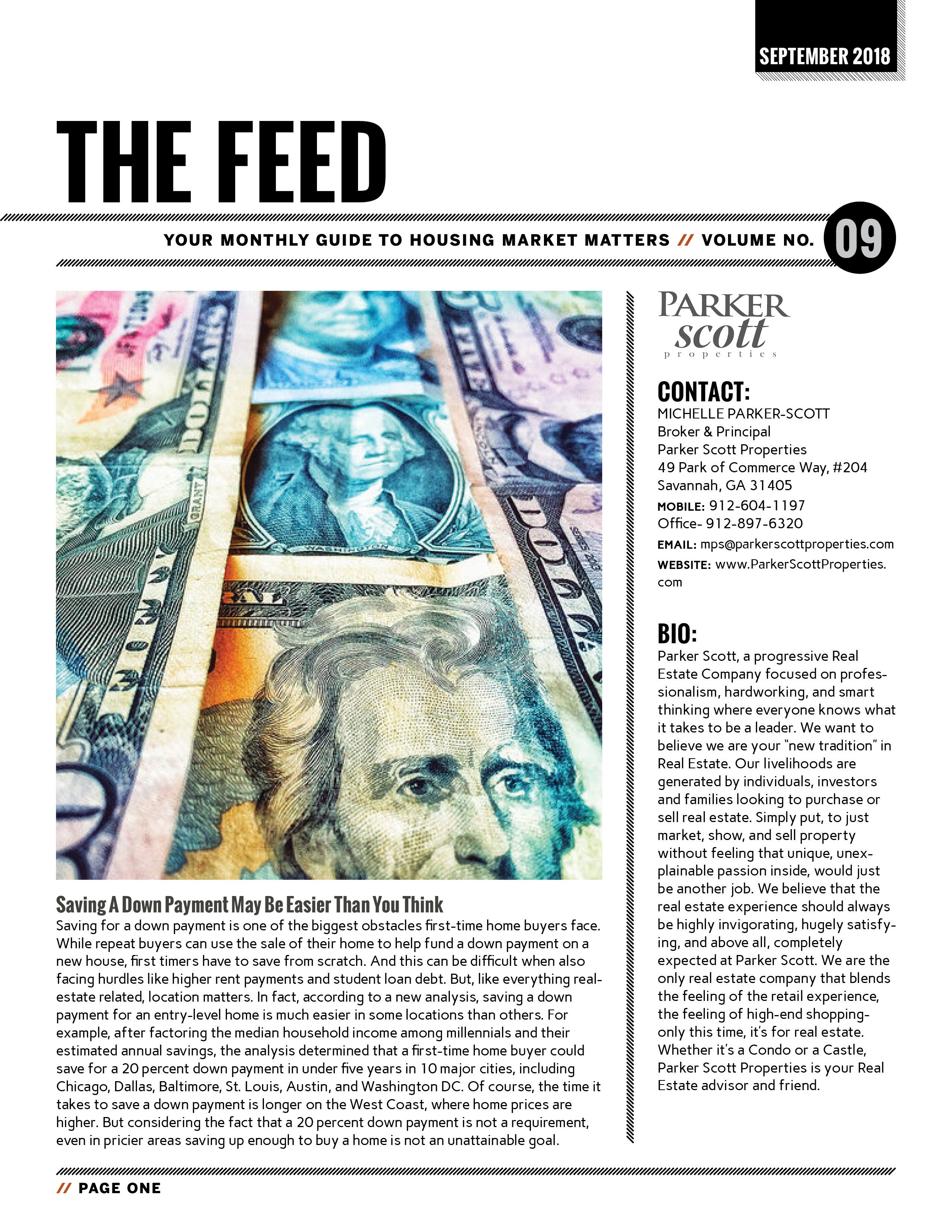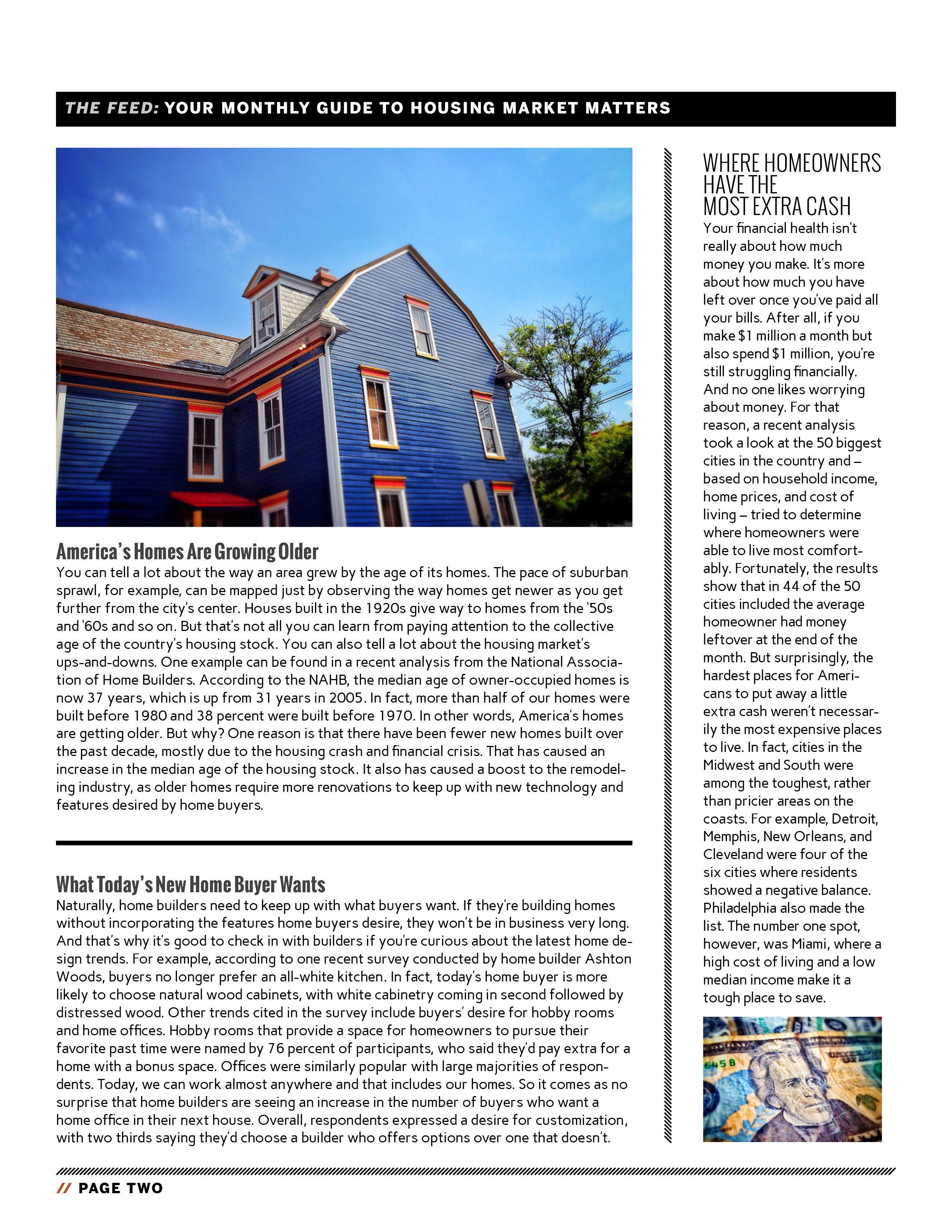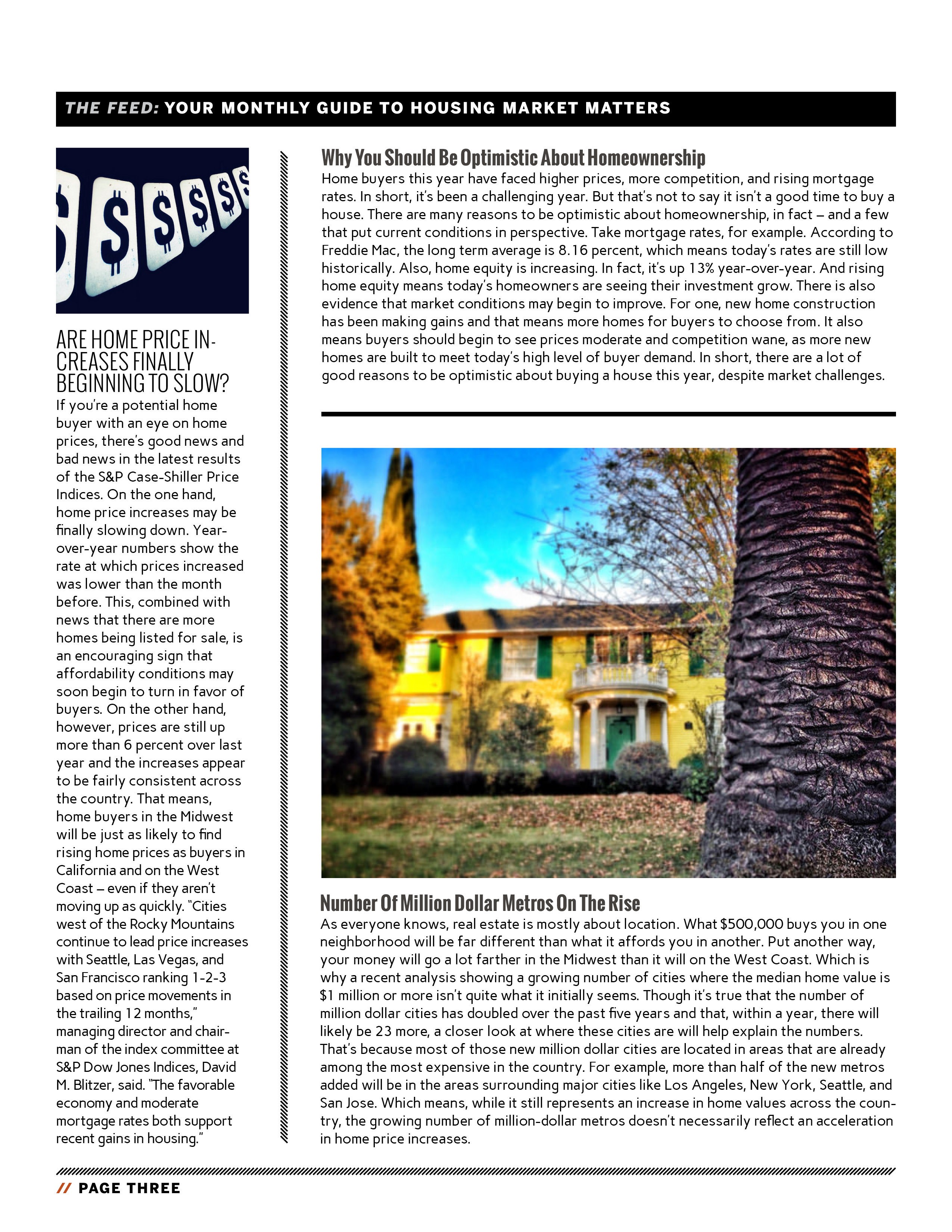It’s said that there are two sides to every story. But there are also two sides to the calculations potential home buyers undergo when deciding whether or not it’s a good time for them to look for a new house. After all, buyers have to take into consideration the cost of homes in the areas they’re looking to live but also their own financial security. That’s why Fannie Mae’s most recent Home Purchase Sentiment Index is encouraging. Because, though Americans have concerns about housing affordability, they are feeling confident financially and secure in their jobs. In fact, the number of survey respondents who said they aren’t concerned about losing their job rose 15 percent over the month before and those reporting that their income is higher than it was 12 months earlier hit a new survey high. Doug Duncan, Fannie Mae’s chief economist, says Americans are feeling the effects of a stronger economy. “Consumers are attuned to the divergence between the slowing housing market and strong macro economy,” Duncan said. “Consumers were less optimistic this month about both home buying and home selling conditions, while perceptions of income growth and confidence about job security are at survey highs.” More here.

HOW TO HURRICANE-PROOF YOUR HOME
Whether you are evacuating from the area or sheltering in place, performing a general assessment of your home and making it hurricane-ready is always the best plan. To prepare your home for hurricane season we suggest you perform an inspection of your property, get the supplies needed to strengthen your home, and talk with your insurance provider to ensure you have proper coverage.
The strong winds present during Hurricanes Matthew in 2016 lead to extensive property damage throughout Chatham County. Many of the ancient oak trees and tall Georgia pines found throughout the area were toppled over with their root system exposed. Before a hurricane strikes, be sure to remove or trim any dead or diseased tree limbs that are hanging over your house or garage. Ensure that trees that can reach your home are healthy and, if they are not, have them removed.
Take time now to do a quick home assessment for any outdoor hazards or repairs that need to be made. Make a list of any work that needs to be done outside as well as any openings to your home that could be penetrated by wind or rain. Check all outside entry doors to ensure they are securely fastened to their frame. If you have a garage door, ensure that you have a brace to help secure it against the strong winds seen during tropical storms and hurricanes. If strong winds are able to breach the garage door the only direction the wind can travel is up, which could remove the roof of your home.
By assessing your property, you could potentially save your home during a hurricane. The other benefit to assessing your home now is that it gives you the time you need to make repairs and purchase supplies. Before a storm hits, many stores sell out of essential items for protecting homes. Purchasing supplies early can save time, money, and ensure you have the products you need to secure your home
Did you know that most homeowner’s and renter’s insurance policies do not include flood insurance? This means that without a separate flood policy, you may be responsible for covering all hurricane-related flood damage out-of-pocket. This could leave you and your family in a tough situation. Given that flooding due to storm surge and heavy rain is one of the leading causes of damage during a hurricane, we urge you to do an insurance checkup. To do this, simply review your homeowner’s or renter’s insurance policy or call your insurance provider to ask if you have adequate coverage and a flood insurance policy. If you need coverage, CLICK HERE. FEMA provides the National Flood Insurance Program to help connect you to local flood insurance agents. Having flood insurance is a vital step in being prepared for hurricane season; act now- flood insurance policies require a 30 day waiting period. Also, it is important to note that flood zones for Chatham County are freshwater ratings, this means that they rate the risk of flooding from rain only and do not take into consideration the risk of rising saltwater flooding from storm surge. If you live in Chatham County you live in a storm surge zone and are at risk of saltwater flood damage. To see what evacuation zone you live in and what your storm surge risk is, CLICK HERE.
Lastly, when filing an insurance claim after a storm, insurance companies may ask for documentation of damages; this includes damage to your home, property, and belongings. One of the easiest things you can do to make this process smoother is to document your home on a regular basis. Documenting your home consists of taking photos and/or videos of your property, home, and belongings. This way you have proof of what you own and what condition your home was in prior to the storm.
By strengthening your home and checking in with your insurance provider now, you are helping to strengthen our community.
Fall Forecast Sees Improvement On The Horizon
There are many different factors that play a role in the housing market’s health. When home buyers and sellers decide that its time for them to make a move everything from their job security to the global economy has an effect. For example, economic instability half way around the world can move mortgage rates, which will affect how much house you can afford. But what you can afford is also affected by how much you earn and how secure you feel in your job. In short, there’s a lot to keep an eye on. That’s why it can be helpful to tune into expert forecasts and opinions, since most of us don’t have the time or inclination to weigh all of the moving parts that determine what it’ll cost to buy the home of our dreams. So what are the experts saying about the upcoming fall market? Well, according to Freddie Mac’s most recent outlook, there may be reason for optimism. That’s because, though they say fall buyers will face many of the same challenges that held summer sales back, Freddie Mac chief economist Sam Khater says there is good news to be found. “The good news is that the economy and labor market are very healthy right now, and mortgage rates, after surging earlier this year, have stabilized in recent months,” Khater says. “These factors should continue to create solid buyer demand, and ultimately an uptick in sales, in most parts of the country in the months ahead.” More here.
Credit Standards And What They Mean To You
There are many factors that play a role in determining whether you’re able to qualify for a mortgage. Credit standards are one of them. But unlike your income or debts, they aren’t as easy to keep up with. They are important, though, so here’s what you need to know. Credit standards refer to the requirements lenders use to determine whether or not you qualify for a loan. When credit standards are tight – as they were following the financial crisis and housing crash – potential buyers have to reach a higher financial standard in order to be deemed creditworthy. When they loosen, the opposite is true and buyers will have an easier time obtaining a mortgage. Because of the role they play in determining whether buyers are approved or not, Fannie Mae’s Lender Sentiment Survey takes the pulse of lenders across the country to determine whether standards have been loosening or tightening lately. Generally speaking, standards have eased since the financial crisis. The survey’s most recent results, though, show little movement from the previous quarter. More here.
Is It A Good Time For You To Make A Move?
Flat Home Sales A Sign Of Market Challenges
New numbers from the National Association of Realtors show sales of existing homes were virtually unchanged from the month before. Down 0.7 percent from June, sales were up in the West but a drop in the Northeast negated the gains. Lawrence Yun, NAR’s chief economist, says a lack of available homes continues to hold sales back. “Listings continue to go under contract in under a month, which highlights the feedback from Realtors that buyers are swiftly snatching up moderately-priced properties,” Yun said. “Existing supply is still not at a healthy level, and new home construction is not keeping up to meet demand.” In short, there are more buyers than there are homes for sale in many markets and it’s making it challenging for buyers this summer. Fifty-five percent of the homes sold in July were on the market for less than a month and, though inventory had been seeing modest gains, it stalled in July. That means, market conditions aren’t likely to change much in the months to come, so buyers should prepare for competition this fall and make sure to be pre-approved by a lender before heading out to look at homes. More here.
Housing Health A Decade After The Crash
Following the housing crash and financial crisis, there was talk that Americans may stop aspiring to homeownership and would no longer see the housing market as a sound investment and reliable creator of wealth. After all, homeowners who saw the values of their homes plummet might become leery and those who hadn’t yet bought a home may’ve considered themselves lucky. And yet, a decade down the road, the market has largely recovered and demand from buyers is running high. Lawrence Yun, the National Association of Realtors’ chief economist, says that is thanks to reforms enacted after the crash. “Over the past 10 years, prudent policy reforms and consumer protections have strengthened lending standards and eliminated loose credit, as evidenced by the higher than normal credit scores of those who are able to obtain a mortgage and near record-low defaults and foreclosures, which contributed to the last recession,” Yun says. And it’s true. Today, market conditions are fueled, not by a lack of a demand, but by a lack of enough homes to meet the high level of demand. Fortunately, Yun sees even more improvement on the horizon. In fact, his forecast for the next year includes rising inventory, moderating price growth, and more home sales as affordability conditions ease and make homeownership even more attractive to prospective buyers. More here.
Please check out our September Newsletter!!




